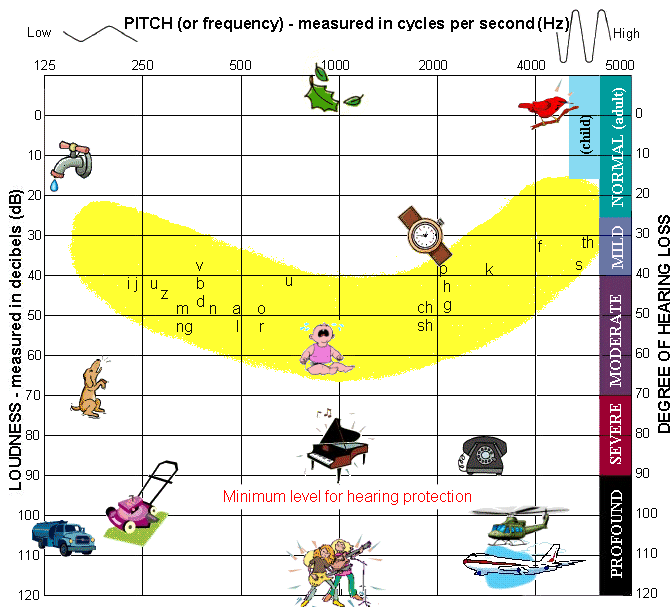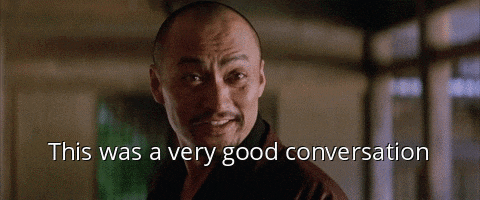If someone else is in the room with you right now, do me a favor. Ask them to come within speaking distance (if they’re not already), and then have them turn around–facing away from you–and say the words “cat,” “cap,” “calf,” and “cast” in any order. Make a sentence out of it, perhaps. Do that now. I’ll wait.
Did it? Awesome. Could you tell what they were saying? If your environment isn’t particularly noisy, I’m gonna guess probably yes. That’s because for most people, the consonants T, P, F, S, and so on are within a normal register of sound, and generally comprehensible. For myself and others with high frequency hearing loss, however, word distinction can be a hit-or-miss game.
High frequency hearing loss, which happens to be my particular brand of HOH (hard-of-hearing), is the name for hearing loss that primarily impacts the 2,000 - 8,000 Hz range—that’s the higher frequencies, AKA higher pitches. A person with high frequency hearing loss will miss out on sounds in that range if the sounds are below a certain decibel level (volume). For instance: remember those ‘mosquito ring tones’ that buzzed at super high frequencies, and were popular among kids because their older teachers wouldn’t register the sound? That’s because aging often leads to degrading hearing, which usually starts in the high-frequency range. Aging isn’t the only cause of hearing loss, though. Environmental exposures and illness can also cause acquired hearing loss; or, like me, you can be born with it.
For two decades of my life I operated under the illusion that my inherited hearing loss didn’t affect me. If I was missing out on all the mosquito ringtones going off in the classroom, I had no knowledge of it; otherwise, I went through life much like a hearing person. I talked verbally with my friends, listened to music, winced at the fire alarm, watched television and movies, and enjoyed my cat’s purring. A vast breadth of sounds occur in the lower frequencies: refrigerator hums, trucks rolling by, a bass drum, rumbling thunder. I’ve never had trouble hearing any of those. Hearing loss? What hearing loss? When I was ultimately assessed in my twenties, though, and given my first hearing aids, I learned all about that theoretically small range of sounds on which I was missing out. Namely, speech sounds.
On a graph of auditory ranges, called an audiogram, human speech sits close to the middle and makes a shape like a banana. (This is, creatively, called the "speech banana.") This shape encompasses the distinct sounds, called phonemes, that make up verbal language as we recognize it, and if you plot out all of these sounds on the graph, you’ll see that not all of them happen at the same pitch. In the high frequencies, these include a collection of consonants, including K, F, S, Th, and more, such as those I listed above. Before you say "that doesn’t seem like much," consider that just the 4000Hz+ sounds (F, Th, S) have already occurred forty-eight times in this paragraph alone… and that’s not including the list of consonants themselves or anything after the word “occurred.”
Why, Chain, you might be asking at this point, how can you manage to hold conversations at all? And how on earth did you manage to go so long without realizing you were hard of hearing? Well, I’ll give a little credence to the fact that louder volume or lower pitch voices can go a long way for my hearing acuity, plus ideal acoustic environments and people who articulate. (Verbal comprehension can rise and fall depending on a variety of conditions.) And it’s not like I miss 100% of things. I can hear and understand a lot of what you say. But mostly, for 20+ years unaided, I’ve developed and utterly mastered an incredibly pervasive skillset to help get me through everyday conversational life: faking it. After years of fine honing, I have a whole regimen in my brain devoted to a hearing-loss-derived phenomenon I like to call Verbal Autopilot.
What is Verbal Autopilot?
Here’s the thing. Unless it’s small-talk with strangers, I actually don’t have a lot of interest in faking conversations. I’d like to know what’s happening when I’m talking to someone, and my compulsive hunger for knowledge can easily outstrip my desire to save face. So why the hell would I so effortlessly pretend my way through so great a percentage of the conversations in which I’m involved?
It happens like this. Like most kids, I was raised to be, you know, polite; and part of being polite meant not being a bad listener. Not being a bad listener meant you paid attention, didn’t miss things, and never had to ask for something to be repeated more than once. Not an easy task for a kid who can’t hear normally. So, naturally, I developed the defensive ability to guess the content of what I couldn’t hear, and proceed with the conversation normally.
But the thing was, I never got out of it. I spent over two decades with this practice so down pat that it became second nature. And by second nature, I mean first nature. Knowing when to nod and laugh or what canned responses to spout after which conversational indicators wasn’t just a skill, it became ingrained instinct—so much so that now, when I actually know I have hearing loss and can accommodate for that without pretense, I find myself spouting the automatic responses anyway. I fake even when I don’t want to fake. My verbal mechanism is quite literally on autopilot – hence the name of my invented syndrome.
How does Verbal Autopilot work?
To automatically produce the likeliest correct replies in verbal conversation, one has to know what one is responding to (or at least be able to guess). Good social awareness will help clue you in on this one; it will help you recognize body language, tone, and facial expressions that indicate that a person is saying something [inquisitive / angry / sad / amusing / confidential / ________] and, by extension, how they want you to react. Conversational indicators are also useful tools for decoding a mystifying conversation – certain cliché phrases are almost always expecting a certain genre of reply, and memorizing these can ensure you (almost) always have the winning answer.
Take facial expressions, for instance. Some of these are basic, i.e. smile = happy and frown = sad, but someone with Verbal Autopilot knows their friends unique facial tics by heart, too. Friend 1 might always do an eye-buggy thing and stretch their mouth to indicate skepticism and/or judgment, so when I see that, I can compute that the safest response is an agreeable, commiseratingly judgmental ‘hah’ sound, eyebrow flick, and spouting something like “God, honestly though” or “For real. People are… wild.” Or Friend 2 might get a particular sort of hopeful, conspiratorial smile when they’ve said something they think is funny, a formula which produces the following function: amused chuckle (can’t overdo it unless whatever they said was only mildly humorous) + eye roll and slight shake of head (easier than specific commentary) + endeared personal comment like “You’re ridiculous” or a fond “Nerd” (deflects attention from the fact that I haven’t actually responded to the content of the joke or story).
Then there’s working off the conversational clichés. Some phrases are used so often that their delivery is standardized and almost always recognizable. This is great for myself and other HOH people to use as conversational landmarks, if you will, to indicate which direction the convo is going and therefore what kind of response to issue. Here are some examples of landmarks and potential auto-responses:
“You know?” → “Yeah no, yeah, I definitely see that.”
Protip: I don’t, actually, because I don’t know what you just said.
“I dunno. [sigh]” → “No, I mean, like, I think that makes sense though.”
Can you tell Verbal Autopilot’s favorite word is “that”? It makes it seem like you’re responding to something specific without saying what that specific something is.
“[insert unintelligible statement here], huh?” → “Maybe just a little.”
This response is great because it neither affirms nor denies whatever the person just said about me.
...and those are just a few off the top of my head.
How does Verbal Autopilot impact a life?
In a few ways. First and foremost, it means I miss everything. Everything! You just told a joke or a funny story and I didn’t hear all of it? Too bad, I already responded with a positive expression of amusement! Can’t ask now. You just gave me a list of important things I needed to do, and I have no idea what you said? Whoops, because I already auto-spurted a canned affirmation that I’ve got it. (I don’t got it.)
Being on autopilot means my mouth just keeps the conversation going whether my brain has caught up with it or not. It doesn’t leave me a chance to ask someone to repeat or clarify, unless I want to go back and say, “Oh, by the way, I know I just said a bunch of things to indicate that I was listening and understood every word you just said, but I was actually faking it. Care to run through it again for me?”
Secondly, even my highly advanced and well-oiled Verbal Autopilot machine is wrong sometimes. It can be very cringey to respond automatically in a given conversation and then get that weird look that means you’ve said something wrong or inappropriate for the context. Worse, sometimes you get asked follow-up questions. “What do you think?” inevitably results in an awkward pause while one must figure out the least offensive way to say, “I can’t say because I don’t actually know what we’re talking about.”
Then there’s the times when you autopilot too well. Just a week or so ago I spent probably ten to twenty minutes having a full conversation with a peer at a group hangout which I think had something to do with frats and partying. Whatever I said, my conversation partner seemed to end up with the impression that I was well-versed in party culture on campus, knew the names and reputations of all the Greek orgs he mentioned, and participated in and had opinions on some types of goings-on that we had apparently been discussing. We genuinely had a full back-and-forth discourse where I had no idea what we were talking about. Whoops?
Of course, Verbal Autopilot can be useful. It’s nice for getting you by in stagnant conversations when distant relatives come by, offering passable small-talk to acquaintances, or not awkwardly halting a discussion with a new friend or love interest by having to pause every three seconds to ask them to repeat.
But for the most part, I just find the development of a Verbal Autopilot, while problematic, undeniably fascinating. It’s a coping mechanism so specific to the particular auditory deficit I have – where I can get by on half full words and most all of the vowel sounds, but have to fill in the rest when that section of the speech banana comes into play.
Moreso, I wonder how strongly developed my Verbal Autopilot would be if I had known from a young age that I was hard of hearing. Would I have felt more justified in actually asking for clarification in conversations? Would I have gotten hearing aids earlier and not had the need to hone the skill so thoroughly? Or would the instinct have been inherently sharpened in response to whatever deficit I still had?
I can’t answer any of those questions, but I can leave you with advice from a professional convo faker. To get to the real good discussions with me—and I can have genuinely good discussions—take a moment to pay attention to how I’m responding. And hey, if you think I’ve got my autopilot switch on, point it out. Chances are, I don’t want to be missing this chat any more than you want me to.


















